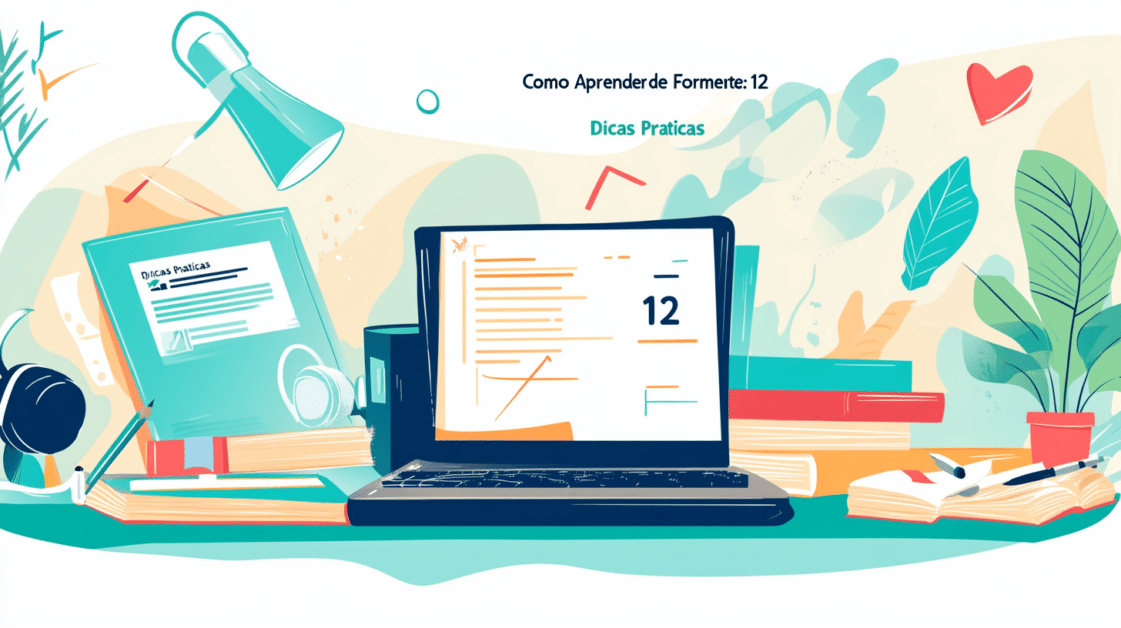Aprender de forma eficiente é uma habilidade essencial que pode transformar não apenas seu desempenho acadêmico, mas também sua vida profissional e pessoal.
Neste post, vamos explorar 12 dicas práticas que podem ajudar você a aproveitar ao máximo suas sessões de estudo e alcançar seus objetivos de aprendizado.
Entenda seu Estilo de Aprendizado
Uma das chaves para aprender de forma eficiente é entender qual é o seu estilo de aprendizado. Existem três estilos principais: visual, auditivo e cinestésico. Cada pessoa pode se identificar mais com um ou mais estilos. Por exemplo, se você é um aprendiz visual, pode se beneficiar de esquemas, gráficos e vídeos. Se é auditivo, discutir os conteúdos ou ouvir gravações pode ser mais eficaz. Experimente diferentes abordagens e descubra o que funciona melhor para você.
Crie um Ambiente de Estudo Ideal
O ambiente em que você estuda pode afetar diretamente sua concentração e eficiência. Certifique-se de que seu espaço de estudo é organizado, bem iluminado e livre de distrações. Um lugar calmo, com todos os materiais necessários à mão, pode ser determinante para a produtividade. Considere também o uso de fones de ouvido com música instrumental para ajudar a bloquear sons indesejados.
Estabeleça Metas Claras
Ter objetivos claros e específicos é fundamental para manter o foco. Defina metas diárias ou semanais de aprendizado, como completar um capítulo de um livro ou resolver um conjunto de exercícios. Isso não só fornece um senso de direção, mas também permite medir seu progresso e fazer ajustes quando necessário. Além disso, ao alcançar essas pequenas metas, você se sentirá mais motivado.
Utilize a Técnica Pomodoro
A Técnica Pomodoro é uma abordagem de gerenciamento de tempo que envolve trabalhar de forma intensa por 25 minutos seguidos, seguidos por uma pausa de 5 minutos. Após quatro ‘pomodoros’, faça uma pausa mais longa, de 15 a 30 minutos. Essa técnica ajuda a aumentar a produtividade e a manter a motivação, prevenindo o esgotamento. Para quem tem dificuldades em se concentrar, essa técnica pode ser extremamente eficaz.
Faça Resumos e Anotações
Escrever resumos e anotações à medida que você estudam não apenas ajuda a fixar a informação, mas também a entender melhor o conteúdo. Utilize a técnica de tomar notas em forma de mapa mental, que pode facilitar a organização das informações de maneira visual. Além disso, revisar essas anotações periodicamente ajuda a reforçar o aprendizado, evitando a perda de informações ao longo do tempo.
Exploração Através de Discussões
Participar de discussões em grupos de estudo ou fóruns online pode ser uma maneira excelente de aprofundar seu entendimento sobre um assunto. Discutir com outras pessoas expõe você a novas perspectivas e interpretações que podem enriquecer seu aprendizado. Além disso, explicar um conceito para outra pessoa é uma excelente forma de reafirmar seu próprio conhecimento.
Utilize Recursos Online
A internet está cheia de recursos educativos gratuitos e pagos. Explore plataformas como Coursera, Khan Academy, Udemy e YouTube, que oferecem cursos e tutoriais em diversas áreas do conhecimento. Esses recursos podem fornecer uma nova abordagem e dicas que podem ser mais convenientes para o seu estilo de aprendizado.
Pratique o Aprendizado Ativo
Em vez de simplesmente ler um texto ou assistir a uma aula, envolva-se ativamente com o material. Isso pode incluir testar-se com exames práticos, debater os conteúdos com um colega ou fazer exercícios relacionados ao seu aprendizado. O aprendizado ativo é mais eficaz porque estimula a reflexão e a aplicação do que você aprendeu, aumentando a retenção.
Cuide da Sua Saúde
O aprendizado eficiente não diz respeito apenas ao que você faz durante o estudo. A sua saúde física e mental é crucial. Pratique exercícios regularmente, mantenha uma alimentação balanceada e assegure-se de dormir o suficiente. Estudos demonstram que a falta de sono e um estilo de vida sedentário podem prejudicar a memória e a capacidade de aprendizado.
Reflexão e Revisão Contínua
Reserve um tempo para refletir sobre o que aprendeu. Pergunte a si mesmo: “O que eu entendi bem?” ou “O que eu ainda preciso revisar?” Essa prática não só ajuda a identificar áreas que precisam de mais atenção, como também solidifica o que você já aprendeu. A revisão contínua é fundamental para garantir a retenção a longo prazo.
Envolva Tecnologia a Seu Favor
Utilize aplicativos e ferramentas online que podem facilitar seu processo de aprendizado. Ferramentas como Evernote, Trello ou Anki podem ajudar na organização e na revisão de conteúdos. Além disso, o uso de softwares específicos, como flashcards digitais, pode tornar o aprendizado mais dinâmico e interativo.
Cultive a Paciência e a Persistência
Aprender é um processo, e pode levar tempo para ver resultados significativos. Cultive paciência e persistência, mesmo quando encontrar dificuldades. A chave é manter uma atitude positiva e reconhecer que cada pequeno progresso é um passo em direção ao seu objetivo final. Lembre-se de que os melhores aprendizes são frequentemente aqueles que nunca desistem.
Conclusão
Aprendizado eficiente é uma habilidade valiosa que pode beneficiar todos os aspectos de sua vida. Ao aplicar essas 12 dicas, você estará no caminho certo para se tornar um aprendiz mais eficaz. Lembre-se de adaptar cada estratégia ao seu estilo de aprendizado e às suas necessidades pessoais. Se você tem mais dicas ou experiências para compartilhar, sinta-se à vontade para deixar um comentário! Vamos juntos construir um ambiente de aprendizado colaborativo e enriquecedor.

